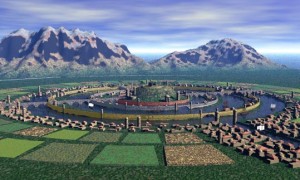Atlantis: myth and history and type C mysteries December 11, 2010
Author: Beach Combing | in : Ancient , trackback Beachcombing wrote a post about pre-Platonic Atlantis a few days ago and he also confessed, in another post, to having a general Atlantis itch this December. Then late last night he woke up sweating with what he can only describe as an Atlantis epiphany. True, Beachcombing has not yet discovered the lost continent in the environs of Little Snoring, his home village. However, he does feel that he better understands the Atlantis mystery in relation to other mysteries from the past.
Beachcombing wrote a post about pre-Platonic Atlantis a few days ago and he also confessed, in another post, to having a general Atlantis itch this December. Then late last night he woke up sweating with what he can only describe as an Atlantis epiphany. True, Beachcombing has not yet discovered the lost continent in the environs of Little Snoring, his home village. However, he does feel that he better understands the Atlantis mystery in relation to other mysteries from the past.
Now with some historical mysteries we have an established reality and luscious legends sprouting up like nettles all around. For example, Princess Diana (to get all British), Charlemagne or, thinking of yesterday’s post, ‘tulipomania’. Beachcombing will call these type A mysteries. The challenge with these is to separate history and myth.
Then there are type B legends where we have a mass of legends and there may (or may not) be, behind them, the glimmering of something historical. Robin Hood, Madog, El Cid and a dozen other names trip off the tongue. Here the challenge is to establish whether there is any history to separate from myth.
What Beachcombing finds fascinating about Atlantis is that it does not fit into either category A or B. In fact, he will have to usher on a third category type C to do justice to the great continent.
Type C mysteries are mysteries that may include ‘real’ legends (meaning beliefs established among a given people) and these legends, if they exist, may contain real historical events. Here the challenge is to establish if there are any legends. In other words we are, with type C, at two removes from the truth. This is not like Merry King Cole, say, (a type B mystery) where we are wondering whether there is history in the legend. This is Atlantis where we do not even know if there is a genuine myth behind Plato’s ramblings or whether Plato invented the whole thing himself. As to history, that is a long way down the menu…
Beachcombing struggles to find other examples of type C mysteries. (Geoffrey of Monmouth?). But perhaps some modern mystery books – the Holy Blood and the Holy Grail? – have a similar relation to the truth. They use inadequate sources badly so that we cannot talk with confidence of any pre-existing legend.
It follows from all this that there are three possible positions on Atlantis.
(i) Plato told the truth and there were Atlantean legends and there was a historical Atlantis behind these legends.
(ii) Plato told the truth and there were Atlantean legends but there was no historical Atlantis.
(iii) Plato invented Atlantis and there was no legend or history behind his invention
Now most modern classicists belong to category (iii). Plato invented Atlantis to explain how the human beehive could and perhaps should work and all his warbling about Solon and written records in Athenian families was so much fish tripe.
This is, at least, in part because of an academic psychological flaw, the ‘irritation factor’ we might call it. You don’t believe Beachcombing? Go to a conference on antiquity and try and engage participants in a discussion on Atlantis and watch as a dark sheen passes over their faces. Something similar happens to Celticists if you mention ‘King’ Arthur or Saint Brendan…
It serves Classicists purposes that Atlantis was all a figment of Plato’s imagination because then the conspiracy-loving hoi poloi can be brushed impolitely to one side.
Beachcombing – substandard Classicist that he is – sneaks tentatively into category (ii). He suspects that Plato did borrow a myth from Egypt – though Plato will certainly have manipulated this myth to his own ends, including perhaps its name, and Plato’s Greek source (Solon?!) will also have, unwittingly, changed details in his attempt to make sense of what he was being told.
In other words Plato’s account should be of interest first to philosophers, second to classicists, but then third to Coptic scholars.
Beachcombing would reject category (iii), because there is nothing in Plato’s necessarily twisted description of the myth that suggests a historical reality playing peekaboo . On the contrary, there are several themes that are more suggestive of mythic archetypes than of physical landmasses. Then those who belong to category (iii) also have to explain the fact that Plato’s description demands that Atlantis went under the waves thousands and thousands of years before writing was established in the Mediterranean.
Beachcombing does love though the poetry of many modern attempts to situate Atlantis and Beachcombing hopes to come up soon with a post of places, islands and oceans in which the poor Atlanteans have been thrown. A provisional A4 sheet in the rusty red filing cabinet has: Cyprus, Malta, the Canaries, Scandinavia, Antartica, Santorini, Indonesia (!), the Red Sea, the Caribbean, North America, Bolivia, Ireland and Venezuela.
Any others please contact drbeachcombing AT yahoo DOT com
Beachcombing continues to worry away about Atlantis here:


